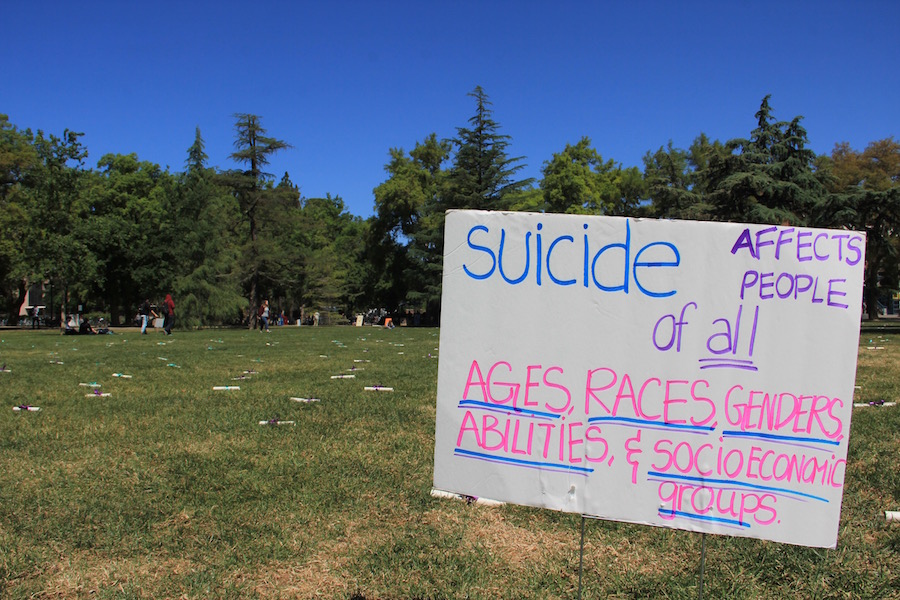
Student mental health advocacy group laid out 1,100 diplomas to raise suicide awareness
UC Davis student health organization Active Minds is hosting its second annual End the Silence event on the Quad this week, on Monday, April 25 and Tuesday, April 26.
The event is intended to raise awareness of the prevalence of mental illness in students attending American universities, and displays 1,100 diplomas individually laid across the Quad to represent the annual number of suicides of college students in the U.S.
Each diploma featured varied statements centrally focused on the destigmatization of mental health advocacy. In addition, the statements called for a greater emphasis on creating a more inclusive environment for students struggling with mental illnesses including depression, suicidal thoughts and anxiety.
“That visual representation [illustrates] how large of an issue suicide is nationwide. It really shows [suicide at universities] is not just an odd occurrence you hear on the news once every couple months,” said Brenna Williams, president of the Davis chapter of Active Minds and a psychology and evolutionary anthropology double major. “These are issues that way more people are dealing with.”
Williams added that one of the goals of the event was to provide information to students who are battling mental illness but have been discouraged from sharing their experiences or seeking out resources provided by the university.
“I would like to see people feel more safe actually explaining their issues, explaining that they’re struggling,” said Active Minds co-vice president and fourth-year psychology and human development double major Julia Flickinger. “Nobody understands that the university is a safe place and that people are struggling with the same things they are too and that there are resources for them to get help.”
According to fourth-year psychology major Ian Nool, a student wellness ambassador for the Campus Health and Counseling Service (CAPS) as well as outreach coordinator for The Mind Spa, many students, especially first-years and transfers, are hesitant to utilize resources offered by the university.
“From my perspective, as a freshman I wasn’t aware of all the resources on campus. The university has done a good job with outreach and putting on events,” Nool said. “It’s just a matter of students knowing that these resources exist and pushing forward so students can know.”
Chaaya Vandha, a third-year psychology major and fellow student wellness ambassador, echoed Nool’s sentiment.
“Sometimes people don’t feel comfortable going to CAPS or to The Mind Spa. They’re scared to come in and make a mistake, and we want to emphasize to freshmen and transfers that there are no mistakes — nothing wrong can happen. We won’t yell at you, we’re here to help,” Vandha said.
Vandha emphasized the accessibility of the mental health resources offered by the university.
“It’s the first step of asking someone for help. It could be your RA, it could be anyone who knows about even some of the resources,” Vandha said. “Starting in one place can get you to so many places because the resources on campus are very intertwined. They all know about each other. They all know what purpose each of us serve.”
ASUCD Senator and second-year English major Sofia Molodanof, who ran on a platform of extending mental health services for UC Davis students, believes the event could greatly benefit the student body and faculty.
“There are all these different aspects of mental health that no one really talks about. Having a whole event on it could give students the tools to get past that stigma,” Molodanof said. “Once we can get past it, there will be more conversations to have, so instead of talking about ‘What did you do last week?’ it could be ‘How are you? How are you feeling? Can I help you in some way?’”
Molodanof explained that she also believes the event can better prepare all students, including those not currently struggling with any mental health issues, to create an inclusive and uplifting environment for their peers suffering from mental illness.
“This [event] would help students know the tools to help others. They may not be struggling with [depression], but they may have a friend who is struggling with mental health and they might not have any idea about it,” Molodanof said. “They don’t know how to talk to them or they don’t know how to help them. Learning about all these resources and being able to start the conversation can really help their friend. Getting the conversation started is what’s most important.”
Written by: Jack Raineri – campus@theaggie.org



